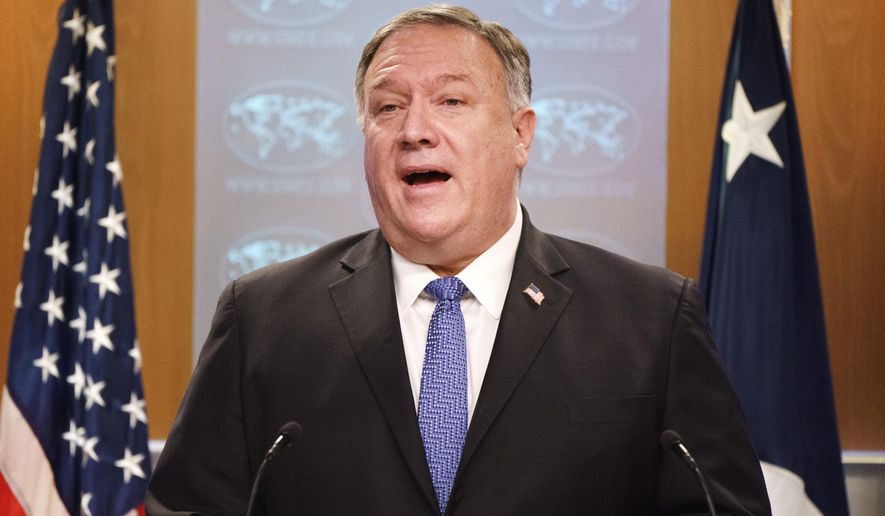Fifty nations have joined the United States in shunning the use of Chinese telecommunications equipment over electronic spying fears, Secretary of State Michael Pompeo said Thursday.
Mr. Pompeo also said the Treasury Department is preparing additional sanctions against China and the State Department will continue its aggressive efforts to counter the threat posed by the Chinese Communist Party.
“I don’t want to get out in front of what decisions the president will make, but make no mistake about the work that we’re doing to counter the threat from the Chinese Communist Party continues,” he said in an interview with radio host Hugh Hewitt. “There’s still a fair amount of work to do. The State Department’s got work to do. Treasury’s still got some things that they’re going to do.”
Mr. Pompeo said the campaign to shift U.S. policy on China is designed to reverse past policies he called “bending a knee, appeasing China, giving them an exception to every international rule set.”
Critics say conciliatory policies by previous administrations toward Beijing placed American jobs and prosperity at risk. The Trump policy began with a focus on trade and shifted to protecting American telecommunications and infrastructure from Chinese competitors such as Huawei Technologies and ZTE, both of which has extensive links to the state.
The “central idea,” he said, was that “if American information is going to flow across some telecommunications infrastructure, we ought to know who’s touching it, and the persons touching it can’t be part of the Chinese military apparatus,” Mr. Pompeo said. “We call it the ’Clean Network.’”
The secretary of state said 50 nations have joined the United States in the effort — a rebuttal to critics who have said the Trump administration did not work with allies and partners in confronting the Chinese. All those nations agree that they do not want Chinese telecommunications equipment or other electronic components inside their critical infrastructures, he said.
The Clean Network program was launched in August to protect domestic and international communications networks and users’ personal information from China, which is engaged in a large-scale data mining. The idea is to convince governments to adopt internationally-accepted security standards for digital information and infrastructure.
That includes making telecommunications carriers, applications and the stores that provide them, cloud computing and cable networks free from Chinese hardware and software. The program seeks to create a comprehensive approach to “safeguarding the nation’s assets including citizens’ privacy and companies’ most sensitive information from aggressive intrusions by malign actors, such as the Chinese Communist Party,” according to a State Department fact sheet.
Among those that are part of the program are the governments and telecom providers for Britain, Japan, Brazil. In Europe, 27 NATO allies are part of the program along with 26 European Union members.
In the United States, Verizon, AT&T, T Mobile, Oracle and Cisco are participants as well.
On another issue,Mr. Pompeo said continued support for democratic-ruled Taiwan in the face of Chinese pressure is bipartisan.
“I think the central understanding is that this is a model for democracy, that the people who live on Taiwan ought to be honored by having the Chinese live up to the commitments that they have made. I think this is something that both parties can agree to,” he said.
The United States recently announced the sale of MQ-9 Reaper strike drones to Taiwan and earlier approved sales of jets and other weapons worth an estimated $5 billion as part of efforts to bolster the island’s defenses.
Mr. Pompeo also said the Trump administration is also continuing to expose Chinese influence operations in the United States, including government payments to institutions and lobbyists.
The counter-influence efforts included restrictions on Chinese government-linked Confucius Institutes operating on university campuses, along with work by the United Front Work Department, the Chinese Communist Party arm that conducts infiltration and covert influence operations in the United States.
“We’ve kicked out spies that were operating in Houston, we’ve made it more difficult for their propaganda arms to operate without registering as foreign agents here in the United States, all really important things,” Mr. Pompeo said.
The overall policy shift has had a major impact on the foreign policy establishment but skeptics remain, he added.
“There are still skeptics, there are still those that want to trade some little bit of business, some perceived market in exchange for American national security,” Mr. Pompeo said.
But that is changing. “For a long time, since the early 1970s, the world has refused to present the real face the Chinese Communist Party is, in fact, showing to the United States,” he said. “And I think we can see now in Europe, we can see it in Africa, we can certainly see it in Southeast Asia. These countries have come to recognize the threat that the Chinese Communist Party poses to their nations.”
Mr. Pompeo recently helped form the so-called “Quad” of Indo-Pacific powers — the U.S., Japan, Australia and India — to counter Chinese economic and military expansionism.
“We’ve all come to recognize that if we work together in the South China Sea, we work together in the Indian Ocean, we work in the ways that the four great democracies can continue to work, we will build out a set of common understandings that deliver increased security in the region for travel, navigation, all the things that the United States cares deeply about,” he said.
• Bill Gertz can be reached at bgertz@washingtontimes.com.




Please read our comment policy before commenting.